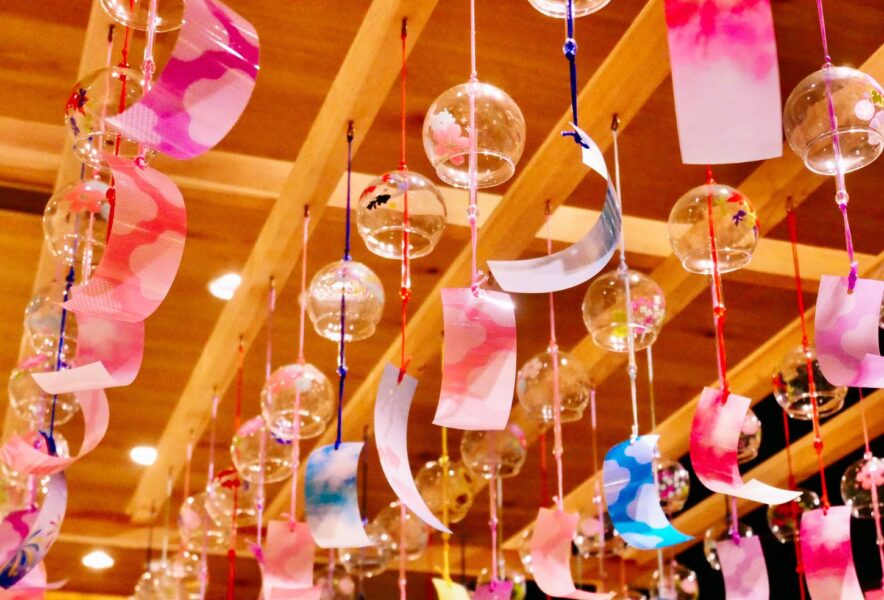Furin, or Japanese wind chimes, are known for their delicate, calming sounds that capture the essence of summer. Made from materials like glass, metal, or ceramic, furin are not only beautiful to look at but also evoke a sense of peace and tranquility with each gentle breeze. These wind chimes are a staple of summer in Japan, and their soft tones are thought to bring a cooling sensation during the hot summer months.
What is Furin? An Introduction to Japan’s Traditional Wind Chimes
Furin (風鈴) are traditional Japanese wind chimes, typically made from glass, metal, or ceramic, that produce soothing sounds when moved by the wind. These chimes are often hung outside homes during the summer months, and their soft, refreshing tones help create a relaxing atmosphere. The cooling sound of furin is a beloved aspect of Japanese summer, and the chimes are often associated with bringing a sense of calm and comfort during the hot weather.
The History of Furin: From China to Japan’s Summer Tradition
The origins of furin trace back to China, where wind chimes were initially used for fortune-telling. Furin were introduced to Japan during the Heian period (794–1185) and were initially used for similar purposes. However, it wasn’t until the Edo period (1603–1868) that glass furin became popular, and their use spread to everyday households. The chimes’ gentle sound became a symbol of summer, and over time, furin evolved into a decorative item that is now an iconic part of Japan’s summer culture.
The Different Types of Furin: Glass, Metal, and Ceramic
Furin come in a variety of materials, each offering a unique sound and aesthetic:
- Glass Furin: Known for their light, clear tones, glass furin have been popular since the Edo period. They often feature colorful designs that add a visual element of coolness in addition to their soothing sound.
- Metal Furin: Made from brass or copper, metal furin produce deeper, more resonant tones. These chimes are commonly found in temples and shrines, and their serene sound adds a touch of elegance and tradition.
- Ceramic Furin: Ceramic furin offer a softer, more muted sound compared to glass or metal. Their designs range from traditional Japanese patterns to modern styles, making them a popular choice for home décor.
The Cultural Meaning Behind Furin: A Symbol of Summer and Relaxation
In Japan, furin are deeply connected to summer and are seen as symbols of relaxation and cooling. The gentle sound of the wind chimes is believed to invoke feelings of “coolness” on hot days, providing a sense of relief from the heat. For many Japanese, the sound of furin is a nostalgic reminder of summer and is closely tied to memories of peaceful evenings spent at home. Additionally, because the chimes’ sound carries far, they are also thought to ward off evil spirits and bring good fortune.
Where to Buy Authentic Furin in Tokyo
Tokyo offers many places to buy authentic furin, especially in popular tourist areas like Asakusa and Ueno. Shops in these areas often carry handmade glass furin crafted by skilled artisans, offering a wide variety of beautiful designs. Furin are also a common sight at summer festivals and local markets, where you can find a colorful array of these wind chimes. One of the most sought-after types is Edo Furin, a style of glass wind chime traditionally made in Tokyo, known for its intricate hand-painted designs and crystal-clear tones. Edo Furin make for a perfect summer souvenir from the capital city.

Comment